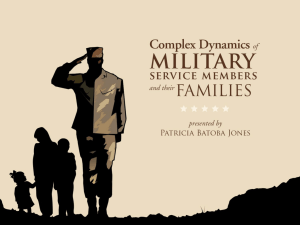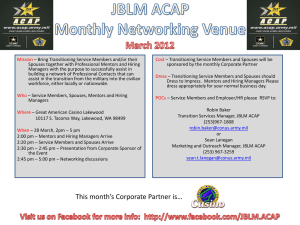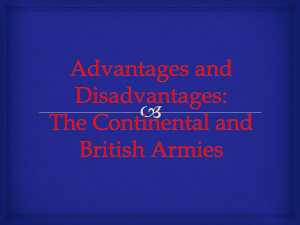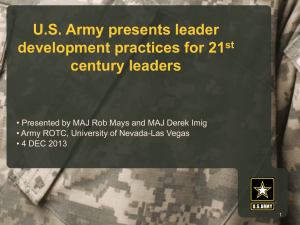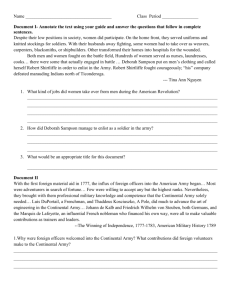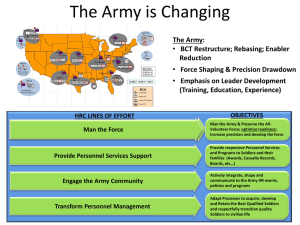Paper - ILPC
advertisement
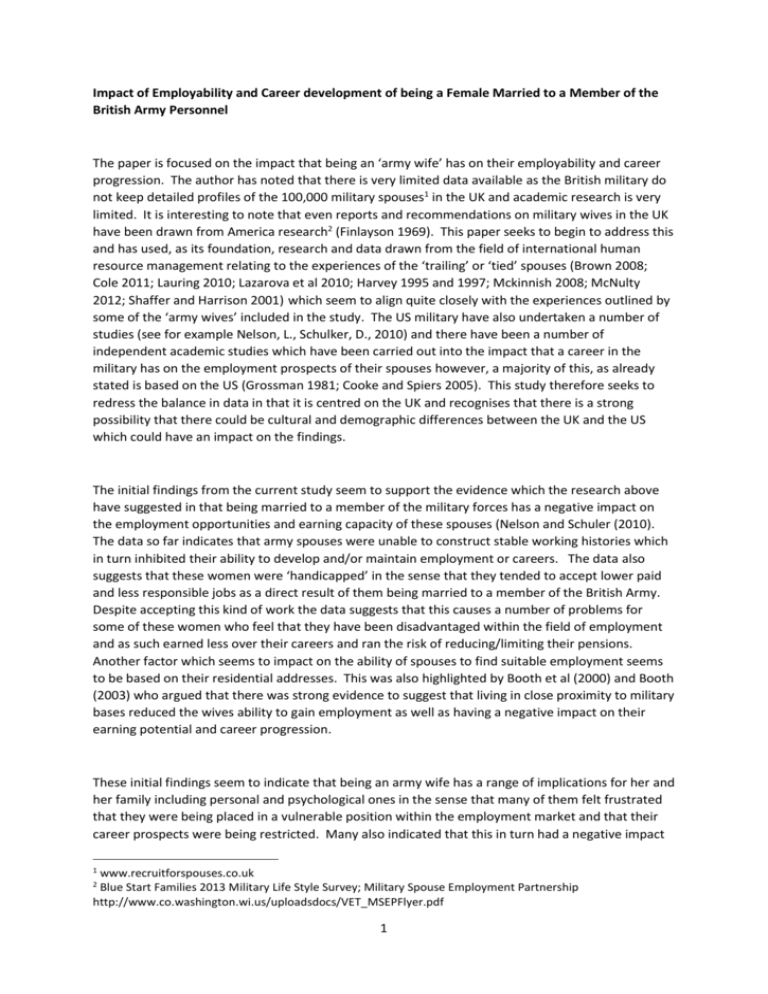
Impact of Employability and Career development of being a Female Married to a Member of the British Army Personnel The paper is focused on the impact that being an ‘army wife’ has on their employability and career progression. The author has noted that there is very limited data available as the British military do not keep detailed profiles of the 100,000 military spouses1 in the UK and academic research is very limited. It is interesting to note that even reports and recommendations on military wives in the UK have been drawn from America research2 (Finlayson 1969). This paper seeks to begin to address this and has used, as its foundation, research and data drawn from the field of international human resource management relating to the experiences of the ‘trailing’ or ‘tied’ spouses (Brown 2008; Cole 2011; Lauring 2010; Lazarova et al 2010; Harvey 1995 and 1997; Mckinnish 2008; McNulty 2012; Shaffer and Harrison 2001) which seem to align quite closely with the experiences outlined by some of the ‘army wives’ included in the study. The US military have also undertaken a number of studies (see for example Nelson, L., Schulker, D., 2010) and there have been a number of independent academic studies which have been carried out into the impact that a career in the military has on the employment prospects of their spouses however, a majority of this, as already stated is based on the US (Grossman 1981; Cooke and Spiers 2005). This study therefore seeks to redress the balance in data in that it is centred on the UK and recognises that there is a strong possibility that there could be cultural and demographic differences between the UK and the US which could have an impact on the findings. The initial findings from the current study seem to support the evidence which the research above have suggested in that being married to a member of the military forces has a negative impact on the employment opportunities and earning capacity of these spouses (Nelson and Schuler (2010). The data so far indicates that army spouses were unable to construct stable working histories which in turn inhibited their ability to develop and/or maintain employment or careers. The data also suggests that these women were ‘handicapped’ in the sense that they tended to accept lower paid and less responsible jobs as a direct result of them being married to a member of the British Army. Despite accepting this kind of work the data suggests that this causes a number of problems for some of these women who feel that they have been disadvantaged within the field of employment and as such earned less over their careers and ran the risk of reducing/limiting their pensions. Another factor which seems to impact on the ability of spouses to find suitable employment seems to be based on their residential addresses. This was also highlighted by Booth et al (2000) and Booth (2003) who argued that there was strong evidence to suggest that living in close proximity to military bases reduced the wives ability to gain employment as well as having a negative impact on their earning potential and career progression. These initial findings seem to indicate that being an army wife has a range of implications for her and her family including personal and psychological ones in the sense that many of them felt frustrated that they were being placed in a vulnerable position within the employment market and that their career prospects were being restricted. Many also indicated that this in turn had a negative impact 1 www.recruitforspouses.co.uk Blue Start Families 2013 Military Life Style Survey; Military Spouse Employment Partnership http://www.co.washington.wi.us/uploadsdocs/VET_MSEPFlyer.pdf 2 1 on their marriages and their mental well being (Lazarova et al 2010; Shaffer and Harrison 2001). However although interesting and important, this study will restrict its focus on an analysis of the employment and career implications of being an ‘army wife’. As indicated above there is relatively little qualitative or quantitative research which has been undertaken within the British Army with regard to the impact of career progression or even the employability of the army wife. However, it is an issue which is increasingly appearing within the British media as the army implements cut backs and restructures to meet the changing military demands of the country (Wyatt 2013; Adams 1993; The Telegraph 2013). It is also becoming increasingly important as the army can no longer guarantee a ‘job for life’ and thus the families are more reliant than at any other period on the possibility of a joint income in order to maintain their life styles etc (Adams 1993). Much of the data available at present is anecdotal, although the Families Continuous Attitude Survey3 does provide some data this must, in the opinion of the author, be developed and improved if army wives are to realise their own potential as well as effectively contributing to the British economy. Wyatt (2013) highlights the problems that many army wives face when seeking employment and outlines how ‘Recruit for Spouses’ which is an organisation that has recently been established which actively seeks to work and educate large employers in the benefits of employing these spouses as well as supporting army wives in their search for employment which matches their qualifications and experience. Heledd Kendrick who is the CEO of Recruit for Spouses, stated that “I saw a huge pool of wasted talent because a lot of wives and partners I me were skilled but also finding it very hard to find work” (Wyatt 2013). She added that many of the wives were ‘forced’ to take work which was below their skill level because they were married to army personnel. On a positive note though companies such as BP, EDF Energy and Capita were working with the organisation in order to seek ways of employing army wives in more effective ways. In fact Kendrick (Hicks 2013) has argued that in today’s technical age there is no reason why organisations could not employ army wives within a virtual or remote working environment. Another aspect that should be considered is the impact that ‘unhappy’ wives have on their husband’s career and in extreme cases they could ultimately cause their partners/husbands to leave the military (Nelson and Schulker 2010) which could have implications for the army in relation to loss of talent and retention. They conclude that a number of factors influenced the behaviour and ‘feelings’ of these women, for example, frequent moves resulted in many becoming demotivated, feeling that they were now ‘second class’ citizens and that it impacted directly on their self esteem. This was reflected in the information that has been gathered and analysed to date in relation to the current study. The data highlights the impact that frequent moves and uncertainty means that 3 https://www.gov.uk/government/statistics/tri-service-families-continuous-attitude-survey-2014 2 wives believe that they lose the ability to offer an employer the consistency that civilian spouses do and thus are prepared to accept lower skilled and paid jobs. Also the fact that many army employees work unpredictable hours which puts pressure on childcare etc. which again has implication for the supporting wife. The Families Continuous Attitude Survey4 which is conducted on an annual basis throughout all three sectors of the British military rejects the claim that being married to a member of the British military has a negative impact on their employability or their ability to progress through their careers. However, it is important to remember that the data from other two services, the navy and the RAF, could have shaped the findings inappropriately in the sense that neither to navy nor the RAF are generally required relocate as frequently as the army and on the whole tend to live in their own houses and therefore not as ‘stigmatised’ as army spouses. Generally most of the data indicates that army wives do experience some form of negative impact directly because of who they are married to. For example, of those who identified having ‘problems’, said they had experienced “some” or “a lot of problems” obtaining paid employment (60%); 42% had experienced “some” or “a lot” of problems in maintaining a National Insurance contribution record; 45% had experienced “a lot” or “some problems” with maintaining a contribution record for state pensions; while 23% had experienced “some” or “a lot of problems” with being assessed for eligibility for state entitlements upon their return to the UK. The Military Covenant Task Force report (2010)5 and the Service Personnel Command Paper (2008)6 indicate that the government wish to ensure that “spouses and other family members of Service personnel receive adequate support ... are not disadvantaged in ... employment due to frequent moves of home”. Unemployment levels for army spouses are higher than the national average (FAMCAS 2010)7 but only anecdotal evidence exists to suggest that spouses often take employment below their skill and education level due to discrimination and an incomplete or fractured work history compared to their civilian counterparts. Arksey and Knight (2007: 17) highlight that the official Government reports may not always be objective and as such have their limitations and thus a heavy reliance on official Government data should be avoided and a wider investigation of the related literature should be undertaken. For example, Grossman (1981) suggested that some contributing factors to unemployment among military spouses was the remoteness of the location of the bases which restricted employment and career opportunities. She added that frequent transfers between locations inhibited “the accumulation of seniority or the acquisition of specialised skills. Many wives find that regardless of former employment experience they must start over at entry level jobs in each new post” (1981:62). Grossman (1981) and Brown (2008) suggest that the wives believed that they were discriminated against by employers who viewed them as a ‘short term’ fix. 4 5 https://www.gov.uk/government/statistics/tri-service-families-continuous-attitude-survey-2014 https://www.gov.uk/government/publications/report-of-the-task-force-on-the-military-covenant 6 http://webarchive.nationalarchives.gov.uk/+/http:/www.mod.uk:80/DefenceInternet/AboutDefence/WhatWe Do/Personnel/Welfare/SPCP/ 7 https://www.gov.uk/government/collections/tri-service-families-continuous-attitude-survey-index 3 To draw these two areas together the author explored the quantitative survey data available from the UK military/MOD surveys, however it does not appear to have ‘delved’ into the detail and feelings behind soldiers and spouses (dis)satisfaction in relation to employment. Nor does it analyse the connection between retention and spousal careers within the UK army. The US studies, coupled with US academic journals have recognised that being married to a member of the military does have a negative impact on their working lives however, they have struggled to ‘prove’ the exact cause. Links have been made to the civilian literature relating to the ‘trialling’ or ‘tied’ spouse. The more recent journals have tried to identify links between spouses’ education and employment opportunities, and retention and reenlistment figures of serving personnel correlated with spouses’ satisfaction with the military and their career options. These resources will be used to help support and guide the present study. The US journals have also posited three main ideas – the monosphony situation in military economic environments, human capital theory, and the household decision model detailed by Wood (1991). Large scale studies have been carried out in the US looking ‘beneath’ the initial military family satisfaction data, unfortunately by comparison there is very little academic literature of that detail in relation to British army personnel at this time. The study, therefore aims to assess the extent to which labour market participation and career progression of the wives of army personnel is affected by their husband’s occupation. The study adopts pragmatic critical realist approach to the collection of data and combines both qualitative and quantitative methods (Mearns 2011). The data was gathered in two stages, firstly, a survey using open and closed questions to collect both qualitative and quantitative data. The questions were based on the literature review and the secondary data identified in the studies examined. Information was sought in relation to hours worked, salary and benefits and examples of discrimination. The second is life histories (Musson 2004) from army spouses. These were in-depth semi structured interviews which the author believed produced a rich and enlightening insight into the working experiences of army wives within the UK. The table below highlights that from the data gathered and analysed to date an army wife is twice as likely to be unemployed and seeking work than the national average as at February 20118 which is a worrying statistic and raises immediate concern in relation to employability of this group of females. Another worrying statistic is that 44.1% of army wives were economically inactive which is, again, much higher than the national civilian average of 23.2%. 8 Office for National Statistics http://www.statistics.gov.uk/pdfdir/lmsuk0411.pdf 4 Table 1.1 Current Employment Status 35% 30% 25% 20% 15% 29% 23% 18% 14% 10% 5% 5% 5% 3% 2% 1% 0% The preliminary findings of the research project indicate that there is a negative correlation between being married to a member of the British army and career progression and job/employment opportunities. Whilst discrimination and employment barriers were generally highlighted the respondents many perceived this to be directly connected to the fact that they were married to a member of the British army. There was a strong feeling that things such as their home address identified them to a potential employer as being married to a member of the British army. Although a large percentage of army wives were not in employment there was clear evidence that there was a desire and in some cases a need to work (see table 1.2 below). 5 Table 1.2 Importance of Career and Employment 100% 90% 80% 70% Very important/important 60% 50% Neither important nor unimportant 40% 30% Unimportant or very unimportant 20% 10% 0% Need money for Always wanted to Supplement family basic family work/have a career income expenses Many of the women who took part in the research suggested that they had encountered some form of discrimination when either trying to gain employment or while trying to pursue a career due to being married to a member of the army personnel. However, the author acknowledges that there is an element of subjectivity in the understanding and analysis of discrimination and it is likely that being rejected for a job could be based on a range of reasons which are unrelated to being married to a member of the British army. It is, however, apparent that some spouses have concluded that who they are married to, their residential address and their fractured CV has resulted in rejection, discrimination and is a constraint on their career progression. There was evidence to suggest that some spouses had resorted to lying in order to gain employment. Some professions, for example teachers, highlighted the constraints that they felt were being placed on them and to some extent felt justified in telling lies. “In one teaching job I was denied an opportunity to be taken on as a permanent member of staff as the employer knew I was a spouse of a serving soldier.” “Being trained as a teacher in England and now posted to Scotland, I was initially unaware how different the education system was. My qualifications aren't recognised and when I arrived here in 2008, I was classed as a teacher from overseas. Many hurdles have had to be overcome to prove my ability to teach here in Scotland and there are still limited opportunities for someone like me who lacks experience of the Scottish system when regular and newly Scottish trained teachers cannot even get jobs. Wanting to further my qualifications in education, I quickly realised that anything related to my profession would not be transferable back to England. Frustrating.” “Never mention the fact I am an Army wife as I know this will affect my position” 6 “Try to not let people know about my husband's job until I am working for them.” “Have lied on numerous occasions, stated my husband is in his last tour and we are settling locally, as address gives away military connection”. Table 1.3 Perceived Impact on Employment and Career Progression 70% 60% 50% 40% 30% 20% 10% 0% The spouses were further asked to identify factors which they felt had had an impact on their employment and/or ability to progress their chosen careers. Table 1.3 shows the perceived impact of being the wife of a member of the British army has on their employability and their career prospects. 45% of the respondents selected “serving spouse away so much it makes it difficult to work”. Reference was made to operational tours which resulted in spouses becoming effectively single parents, the author acknowledges that this is not uniquely limited to military personnel however, combined with living many hundreds of miles from family who could assist with emergency childcare etc does pose added stressors. When operational tours were not mentioned in the comments it was other army related commitments such as the frequency of training, Mess meetings, long hours and military exercises resulting in soldiers frequently being away from home even when not on operational duty. In conclusion the findings to date support much of the evidence which has been drawn from the field of international HRM and the impact on this has on family life especially with regard for those who become the ‘trailing’ or ‘tied’ wife (Briscoe, Randall and Tarique 2012; Crowley-Henry 2012; Harzing and Pinnington 2010; Linehan and Scullion 2004) and US research. The data and analysis from the expatriate experiences is considered relevant and justifiable as they are comparable situations and many of the feelings expressed are reflected in the ‘trailing’ or ‘tied’ spouse publications. The analysis of the literature further, considers the social suitability and ‘fit’ of spouses 7 in unfamiliar situations such as in an international environment which was felt again very relevant to the present study. The conclusions of most of the researchers consider the impact of employment or lack of employment opportunities on the spouses as well as the potential and real impact on their future careers to be negative (Copeland and Norrell 2002). The military based academic literature in the field has been predominantly drawn from American data. Again the findings indicated that being married to a member of the America military had a negative impact on employment opportunities and earning capacity of the female spouse (Nelson and Schulker 2010). The conclusions that were drawn in the literature suggested that this had been caused by the fact that the women generally moved between jobs on a regular basis and had failed to build up a stable working history (Nelson and Schulker 2010). For example, the evidence suggests one in four American military families move across county lines while only one in twelve civilians do. There was also a strong positive correlation between the distance and frequency of the moves and the ability of female spouses to obtain and sustain employment. While this clearly had an impact on the working experience of the females the women also played an important part in their career development as there was evidence that supported the claim that “knowing that they [were] likely to move frequently” made them more willing to accept lower skilled jobs on reduced wages with less career opportunities (Nelson and Schulker 2010). Another contributing factor which encourages female spouse to accept less secure employment is the unpredictability of their serving spouses hours and the caring responsibilities of the family. Unfortunately, British researchers have not undertaken a similar in-depth study so it is difficult to fully contextualise the present one in comparative data. However, Tri-Service Families Continuous Attitude Survey (FAMCAS)9 conducted by the Military of Defence have conducted a number of annual surveys which have explored some of the issues relating to this research project. The FAMCAS (Rogstad and Lowe 2010) survey gathers data on a wide range of issues which did include some reference to employment issues. The survey Rogstad and Lowe (2010) undertook suggests that some of British military spouses had indeed experienced “problems” in obtaining and progressing their careers through paid employment because of the profession of their husband. The survey also stated that military spouses (42%) had experienced some problems in maintaining their National Insurance contributions and thus having a negative impact on State pension entitlements and 23% of the respondents highlighted that they had had problems when trying to get assessed for their eligibility for various State benefits on their return of the UK. The Military Covenant Task Force Report (Strachan, Armour, Healy and Smith 2010) and the Service Personnel Command Paper (2008) both indicated that the Government wanted to make sure that female spouses and their families were given adequate support and that they were not disadvantaged in relation to their employment prospects because they were required to frequently move homes. Unemployment levels for army spouses are noticeably higher than the national average (Rogstad and Low 2010). However, the researchers have only been able to identify anecdotal evidence which suggests that female spouses have often been ‘forced’ to take employment which is below their skill and educational capabilities because of discrimination and/or because of an incomplete or fractured work history when compared to their civilian counterparts. 9 https://www.gov.uk/government/collections/tri-service-families-continuous-attitude-survey-index 8 Common themes which appear to be emerging from the data and the literature seem to indicate that army wives are disadvantaged in a number of areas relating to their employability and the chances of career progression. The data indicates that many perceived that even when gain employment they have to “start again at the bottom of the career ladder” each time that they move to a different location; that they feel that they encounter much more difficult in insurmountable barriers to gaining employment than their civilian counterparts; that they are disadvantaged in accessing employment opportunities as they are “forced” to balance the needs of their families with their own careers; and that they believe that they are psychologically damaged in the sense that the negative impact of their employment experiences reduces their self confidence and lowers their self worth. Grossman (1981) used the word “stigmatisation” by US employers towards military spouses, and the evidence in this report show that British military spouses also consider that they are being stigmatised. This is perceived by many to be based on their home address on their CV, and their fractured CV’s. Grossman’s identification by employers that they consider military spouses “short term” was supported by this perception in the UK with spouses resorting to lying to combat preconceived (and often correct) ideas that they will move on in a few years. What was particularly surprising was that nearly 38% of spouses reported some form of discrimination specifically related to being part of the army community in their employability and career progression. What was strongly identified in the interviews was the ‘trade off’ that spouses make between their careers and their serving husbands careers as part of the household decision making model. Each interviewee expressed recognition of the decision making process, either by determining that their time would come eventually or that they had even made the wrong decision. This information is particularly pertinent when considering the retention factors and motivators of serving personnel. The FAMCAS10 survey highlighted that spouses had problems maintaining accurate records such as those for the National Insurance for example, between 40 and 50 percent of spouses felt their records were inaccurate. The women also highlighted the impact that frequent relocation had on aspects such as company pensions. These factors indicate that when analysing the data, the financial impact of regularly changing jobs is not as simple as a straightforward salary comparison with civilians in the same role. Strong evidence in the survey results related to the frequent instances of these women feeling that they are having to start at the bottom each time a new job is begun, resulting in frustration, loss of income, and feelings of low self esteem. These factors without doubt have an impact on the family unit as well as the working life experiences of these spouses. Despite these negative conclusions it is reassuring that the issues highlighted above have begun to be recognised and addressed by a number of sources for example ‘Recruit for Spouses’ who are raising the awareness of employers to the talents and benefits of employing army wives (Wyatt 2013). Organisations such as the Civil Service and the Military of Defence have recently recognised and are promoting the value of employing military spouses: 10 https://www.gov.uk/government/collections/tri-service-families-continuous-attitude-survey-index 9 "I would be very happy to endorse this campaign and I am determined that the Civil Service remains a positive and equal employer of military spouses. The Civil Service has a diverse workforce that delivers a wide range of functions across the UK and recruits through fair and open competition with appointments based on merit, ensuring equality of opportunity regardless of personal circumstances. We have also recently written to all Departments asking them to do all they can to help existing Civil Servants who wish to return to their previous department at the end of their partner or spouse's posting. Each department has its own policies on recruitment and reinstatement which can be used to positively support these situations. In addition, departments have been asked to look at access to unpaid career breaks, which is an option in many departments, and which can allow an individual to maintain continuity of service with an agreed return date" Sir Bob Kerslake The Prime Minister, David Cameron, recently awarded this not for profit organisation, the Big Society Award in order to recognise the work that this group is doing to address the employability and career development of military wives. Cameron stated: “The families of our armed forces make extraordinary sacrifices everyday as they support husbands, wives and partners through deployment after deployment. The government is doing more to support these families. It’s inspirational to see Heledd [CEO of Recruit for Spouses] do so much to help thousands of military spouses start or maintain fulfilling careers. This work shines a light on the huge range of talent and skills that can sometimes be overlooked amongst military spouses. I’m delighted to be recognising their achievements with this Big Society Award”. The paper concludes that Army spouses are disadvantaged within the field of employment and further that this has emotional and psychological impact on areas such as self-confidence and selfworth. Being married to a member of the British army also had further negative work related implications, such as loss of earnings and pensions. The paper also highlights that being married to Army personnel places barriers which make it difficult for these women to find suitable work in the different geographical locations which they are frequently asked to move to. The evidence also suggests that this has a similar impact on their ability to develop a fulfilling career and potentially on their psychological well being. The author acknowledges that although the early analysis of the data suggests that being married to a member of the British army negatively impacts on their employability and career progression more data is required. It is suggested that a higher percentage of army wives are included in the data gathering process both in relation to the survey as well as the life history interviews. It is also recommended that the research forms part of a longitudinal study in order to gather data which could examine impact on pensions, National Insurance contributions and career progression. 10 References Adams, A., (1993) “Rebellion in the Non-Commissioned Ranks: For Many Army Wives, each Posting Abroad Means More Self Sacrifice” The Independent 13 May 1993 Arksey, H and Knight, P (2007) Interviewing for Social Scientists Second Edition SAGE Publications Blue Star Families 2013 Military Life Style Survey Booth, B (2003) “The contextual effects of military presence on women’s earnings” Armed Forces and Society Vol 30 No. 1 Booth B, Falk WW, Segal DR, et al.(2000) ”The impact of military presence on local labor markets on the employment of women” Gender and Society Vol 14 No. 2 Brisco, D., Randall, S, Tarique, I., (2012) International Human Resource Management New York, Routledge Brown, R., (2008) “Dominant Stressors on Expatriate Couples During International Assignments” International Journal of Human Resource Management Vol. 19 No. 6 Castaneda, L.W, Harrell, M.C., (2008) “Military spouse employment: a grounded theory approach to experiences and perceptions” Armed Forces and Society Vol 34 No. 3 Cole, N., (2011) “Managing Global Talent: solving the Spousal Adjustment Problem” International Journal of Human Resource Management Vol. 22 No. 7 Cooke, T., Spiers, K., (2005) “Migration and Employment Among the Civilian Spouses of Military Personnel” Social Science Quarterly Vol. 86 Copeland, A., Norrell, S., (2002) “Spousal Adjustment on International Assignments: The Role of Social Support” International Journal of Intercultural Relations Vol. 26 No. 3 Crowley-Henry, M., (2012) “Migration and Gender: The Trailing Spouse” The MUI Maynooth School of Business Families Continuous Attitude Survey (2009; 2010) http://www.mod.uk/DefenceInternet/AboutDefence/CorporatePublications/PersonnelPublications/ Welfare/TheNationsCommitmentCrossgovernmentSupportToOurArmedForcesTheirFamiliesAndVete rans.htm Finlayson, E., (1969) “A Study of the Wife of the Army Officer: Her Academic and Career Preparation, her current Employment and Volunteer Services” Doctoral Thesis, University of Wisconsin Frankel H, Snowden LR and Nelson LS (1992) “Wives’ Adjustment to Military Deployment: An Empirical Evaluation of a Family Stress Model,” International Journal of Sociology of the Family Vol 22 Grossman, A., (1981) “The Employment Situation for Military Wives” Monthly Labor Review Handler, C., Lane, I., (1997) “Career Planning and Expatriate Couples” Human Resource Management Journal Vol. 7 No. 3 11 Harrell, MC (2000) Invisible women – junior enlisted Army wives, RAND Corporation http://www.rand.org/content/dam/rand/pubs/monograph_reports/2007/MR1223.pdf Harvey, M., (1995) “The Impact of Dual Career Families on International Relocations” Human Resource Management Review Vol. 5 No. 3 Harvey, M., (1997) “Dual-Career Expatriates: Expectations, Adjustments and Satisfaction with International Relocation” Journal of International Business Studies Vol. 28 No. 3 Harzing, A., Pinnington, A., (2010) International Human Resource Management London, Sage Hicks, F., (2013) “Wanted Military Wives and Husbands. Good Rates of Pay” The Lady Lakhani, H., (1994) “The Socio Economic Benefits to Military Families of Home-Basing of Armed Forces” Armed Forces and Society Vol. 21 No. 1 Lauring, K., Seimer, J., (2010) “The Supportive Expatriate Spouse: An Ethnographic Study of Spouse Involvement in Expatriate Careers” International Business Review Vol. 19 Lazarova, M., Westman, M., Shaffer, M., (2010) “Elucidating the Positive Side of the Work-Family Interface on International Assignments: A Model of Expatriate Work and Family Performance” Academy of Management Review Vol. 35 No. 1 Little, R., Hisnanick, J., (2007) “The Earnings of Tied-Migrant Military Husbands” Armed Forces and Society Vol. 33, No. 4 Linehan, M., Scullion, H., (2004) “Towards an Understanding of the Female Expatriate Experience in Europe” Human Resource Management Review Vol. 14, No. 4 McKinnish, T., (2008) “Spousal Mobility and Earnings” Demography Vol. 45, No. 4 McNulty, Y., (2012) “Being Dumped in to Sink or Swim: An Empirical Study of Organisational Support for the Trailing Spouse” Human Resource Development International Vol. 15 no. 4 Mearns, L., (2011) “Pragmatic Critical Realism: Could this Methodological Approach Expand our Understanding of Employment Relations?” Work: A Journal of Prevention, Assessment and Rehabilitation April 2011 Vol. 38 No. 4 Military Spouse Employment Partnership http://www.co.washington.wi.us/uploads/docs/VET_MSEPFlyer.pdf Musson, G., (2004) “Life histories” in Essential Guide to Qualitative Methods in Organisational Research Eds Cassell, C., Symon, G., 2004 Sage, London Nelson, L., Schulker, D., (2010) “Measuring Underemployment Among Military Spouses” RAND Payne, D., Warner, J., Little, R., (1992) “Tied Migration and Returns to Human Capital: The Case of Military Wives” Social Science Quarterly Vol. 73 Recruit for Spouses www.recruitforspouses.co.uk Rogstad, G., Arthur, T., Lowe, S., (2010) “Tri-Service Families Continuous Attitude Survey” Ministry of Defence Schwartz, J., Wood, L., Griffith, J., (1991) “The Impact of Military Life on Spouse Labour-Force Outcomes” Armed Forces and Society Vol. 17, No. 3 Service Personnel Command Paper (2008) Ministry of Defence 12 Shaffer, M., Harrison, D., (2001) “Forgotten Partners of International Assignments: Development and Test of a Model of Spouse Adjustment” Journal of Applied Psychology Vol. 86 No. 2 Strachan, H., Armour, T., Healy, P., and Smith, M., (2010) “Report of the Task Force on the Military Covenant” Ministry of Defence The Telegraph “Military Wife: The Army’s Job Cuts Have Broken my Trust” 20th February 2013 Tri-Service Families Continuous Attitude Survey Report (FAMCAS) 2010 http://www.mod.uk/NR/rdonlyres/2CE13EF2-DDBD-45AB-A48EEA4B5964714C/0/famcas2010report_final.pdf Wood, L. L., (1991) “Family Factors and the reenlistment intentions of army enlisted personnel” Interfaces Vol 21 (4) pp92-110 Wyatt, C., (2013) “Finding Work for the Military Wives” http://www.bbc.co.uk/news/uk-22011015 13
